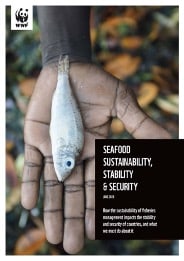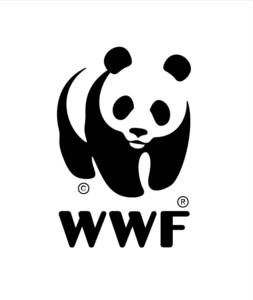Publications Fishforward
The publications below focus on themes (un)sustainable seafood from developing countries, particularly on poverty reduction and global interdependencies, seafood supply chain, gender, climate, overfishing and others, all related with fish sector.
The key findings of the following publications are at the heart of the awareness raising campaign and its related activities.
Sea bass and sea bream supply chain study: from Turkey to Europe
As the largest importers of wild-caught and farmed seafood in the world, the European Union (EU) and United Kingdom (UK) have significant impacts on people, the ocean and climate. Consumption patterns and behaviours, sourcing policies of retailers and food services providers, and government regulatory requirements all have a substantial influence on how seafood is produced in source countries, particularly developing countries outside the EU.
European sea bass (Dicentrarchus labrax) and gilthead sea bream (Sparus aurata) (SBSB) are becoming increasingly popular choices in European markets. Global production over the last decade (2008-2017) has increased by 86% for sea bass and 68% for sea bream alone, and developing countries are by far the largest contributors to this. Turkey in particular is one of the world’s leading producers of SBSB and an important exporter of seafood to Europe.
This report provides a comprehensive snapshot of the supply chain for Turkish SBSB exports to Europe, with a focus on the UK and Austrian markets, and highlights the significant interdependency between seafood producing and consuming countries. Surveys were conducted to uncover the environmental and social aspects of SBSB production in Turkey and requirements set by markets in Europe.
Policy brief Download:
- EN 2021 (pdf) version
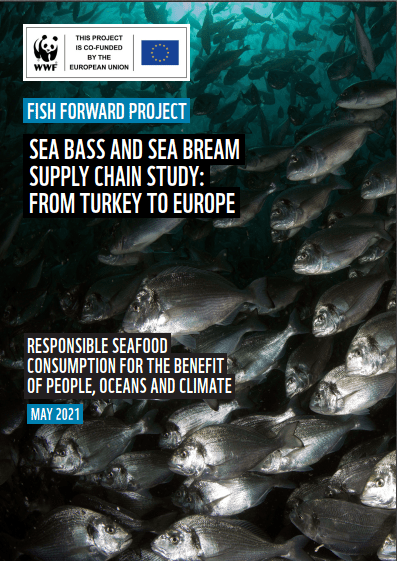
EMPOWERING WOMEN IN MARINE COMMUNITIES TO MITIGATE THE IMPACTS OF CLIMATE CHANGE
While 80-90% of the workforce in the global seafood processing industry and 70% of the aquaculture processing workforce is female, these positions exemplify gender disparity as they are mainly low-skilled, low-paid and low-valued jobs. Women play a key role in ensuring food security and sustainability of the global seafood sector, yet the knowledge, skills and decision-making tactics of both women and men are currently absent from discourse on natural resource management and adaptation to climate change. WWF calls on decision makers to embed gender equality in all development and conservation policies. This will empower women to effectively fulfill their roles as environmental stewards whilst simultaneously addressing climate change and the interconnected social challenges we face as a global society.
Policy brief Download:
- EN 2019 (pdf) version
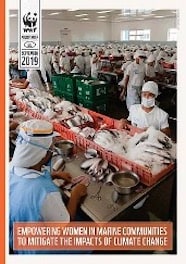
ACHIEVING TRANSPARENCY AND COMBATING IUU FISHING IN RFMOs Reinforcing the EU’s multilateral actions to promote best practices
Environmental Justice Foundation (EJF), Oceana, The Nature Conservancy, The Pew Charitable Trusts and WWF – the EU IUU Coalition, launch a report outlining the minimum transparency and anti-IUU fishing measures deemed vital for Regional Fisheries Management Organisations (RFMOs), the international and transnational bodies who manage fisheries activities for many of the world’s most valuable fish stocks, to adopt and implement. These recommendations span from the point of harvest (where identification and tracking of vessels activities are needed), through the landing, transportation and trade of fish products, including traceability systems along the value chain.
report download:
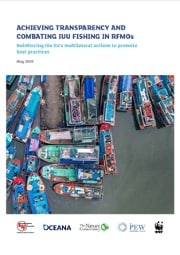
SECURING THE FUTURE OF FISHERIES – Minimum measures to effectively combat IUU fishing
Given the complexity of IUU fishing, combating it requires a host of measures that respond to various parts of the problem. WWF has compiled the most important governance elements that must urgently be addressed to ensure a robust fisheries management system that is capable of effectively combatting IUU fishing. These elements are based on internationally agreed legal frameworks and best practices standards, and are presented as the minimum steps necessary for establishing comprehensive responses to IUU fishing activities.
A robust legal framework and appropriate national plans of action are key to combatting IUU fishing effectively, but these systemsare only as good as their implementation. These recommended actions will enable national fisheries authorities to assess how well their systems are poised to respond to the challenges of IUU fishing, and whether national systems are able to deliver on their international obligations as coastal, flag, port or market States.
Policy brief Download:
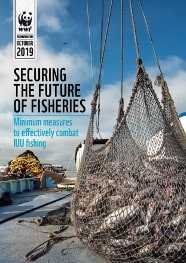
Climate Change Ocean and Fisheries (Layman Summary)
This paper explains what climate change means for our ocean, and what that in turn means for us.
Overfishing, pollution and habitat destruction have had a devastating impact on marine ecosystems and the life they support; and now these pressures are being amplified by another human factor: climate change.
As the ocean provides livelihoods for millions of people, and food for billions. It supports amazing biodiversity and it regulates our climate. It produces oxygen and absorbs carbon dioxide. Ours is a blue planet, and we all depend on a healthy ocean. But our ocean is in trouble, and we are responsible.
Rising levels of CO2 in the atmosphere and the higher temperatures it brings are changing our ocean. The waters of the world are warming and becoming more acidic, and the damage is already visible all around us.
At 2016 it was achieved the highest ocean temperatures on record, as well as the highest levels of CO2. Arctic sea ice receded further than ever before. From rising seas and dying coral to extreme weather and collapsing food webs, change is happening right now.
Factsheet Download:
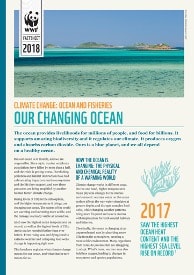
Illegal, Unreported and Unregulated Fishing
Pirate fishing: Illegal, Unreported and Unregulated fishing (IUU) is one of the main impediments to achieve sustainable fisheries. IUU fishing represents a major loss of income, particularly to poor fishing communities who depend on fishing for food and income.
Poor management and regulations: for many global fisheries, rules are not strong enough nor are they sufficiently monitored, controlled and enforced. Regional Fisheries Management Organisations(RFMOs) are failing to improve the sustainability of fish stocks. Bycatch provoced by intensive, industrial fishing is also a serious problem endangering many marine species.
Demand and consumption: Fishing happens largely beyond the public eye. Many fish processors, buyers and retailers don´t really know where the fish they are selling comes from or if it meets sustainability criteria. Only when our seafood is traceable can markets and legal systems be effective.
Return on investment: The global fishing industry is losing more than 50 billion dollars a year in potential benefits due to badly managed fisheries. The transition to more sustainable fishing needs to be supported by a strong financial framework that addresses the fishing crisis and marine ecosystem loss.
Guidance paper download:
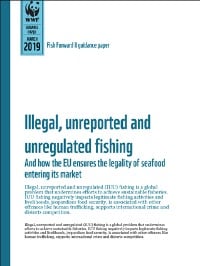
Human welfare in sustainability assessment
The purpose of this document is to research possible ways of including dimensions of human well-being into existing sustainability assessments (e.g. CAM Guidance document) and future options for assessment (e.g. Actual CAM Assessments). Through a better understanding of how sustainability assessments could incorporates aspects of human dimensions only then can an Ecosystem Approach to Fisheries management really take effect.
Download:
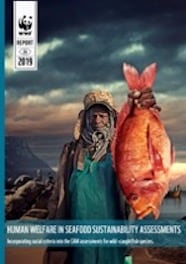
Mitigating Climate Change impacts on food security form the Ocean
70% of the EU’s seafood is imported, much of it from nations whose fisheries are already experiencing the adverse impacts of an overfished, warmer ocean.
Implementing legal frameworks in the face of accelerating climate change and integrating adaptive measures into strategies and national policies are now crucial steps to support the EU meeting its international commitments under the UN Sustainable Development Goals (SDG), including Zero Hunger (SDG 2) and Life Below Water (SDG 14).
To achieve this, WWF urges all Member States and industry stakeholders to intensify efforts towards sustainable fisheries and ecosystem-based management of our ocean.
This WWF policy brief describes how climate change is impacting fisheries and food security, and highlights the European Union’s role in mitigating these impacts both for EU citizens and for developing countries. Seafood is the primary protein source for an estimated three billion people globally, while an equal number depend on marine and coastal biodiversity for their livelihoods. In the EU alone, fisheries, tourism and shipping industries provide millions of jobs to coastal communities, forming the backbone of Europe’s blue economy. .
Policy brief download:
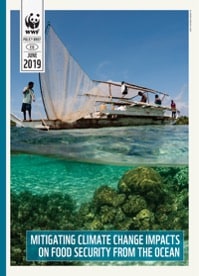
Out of Sights Out of Mind
A comprehensive review of the CFP’s external dimension and links to achieving the UN SDGsThrough Sustainable Fisheries Partnership Agreements (SFPAs) or other forms of agreements, the EU fishing fleet engages in extensive fishing activities in the Exclusive Economic Zones (EEZs) of other countries. Vessels operating in these territories are known as the distant water or external fleet.
It is, however, difficult to evaluate the sustainability of the EU’s external fishing practices due to lack of formal documentation and scientific data as well as many cases of misreporting and continued problems of Illegal,
Unreported and Unregulated (IUU) fishing. The United Nations Agenda 2030 and 17 Sustainable Development Goals (SDGs) represent a useful framework to evaluate the contribution of the CFP’s external dimension to implementing sustainable development.
This report undertakes a comprehensive review of the CFP’s external dimension, the SDGs and the role of SFPAs and RFMOs clearly illustrating where strengths and deficiencies lie when considering Europe’s fishing activities outside of EU waters. Recommendations highlight specific areas for improvement to move the EU’s external fleet towards a more sustainable future as outlined by the SDGs.
Report Download:
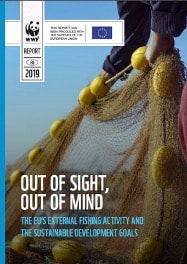
Evaluating Europes Course to Sustainable Fisheries by 2020
This report shows that insufficient progress has been made across all major themes of the Policy, with national marine strategies failing to include clear, concrete objectives in line with the CFP. EU Member States miss the mark on provisions for sustainable and viable fishing, healthy marine ecosystems and biodiversity conservation.
WWF calls on Ministers to urgently take the necessary steps to deliver the CFP objectives by 2020 and secure thriving coastal communities, resilient fish populations and comprehensive protection for threatened marine ecosystems. The European Commission and Member States must fulfil their commitments to propagate transparent and ambitious initiatives to deliver the CFP’s sustainability objectives.
Report Download:
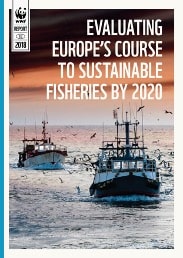
Seafood Sustainability, Stability & Security
This joint report from the WWF European Policy Office and WWF-France shows how the sustainability of fisheries management impacts the stability and security of the EU Member States and their trade partners.
Covid-19 has called attention to key shortcomings in the global fisheries industry, making it critical for the EU to consider how, within the contexts of the European Green Deal, the Farm to Fork Strategy and the Biodiversity Strategy, it will tackle the lack of transparency in supply chains of seafood products entering the EU.
While the EU, the world’s largest seafood market, has established legislation to address issues around unsustainable seafood including the Common Fisheries Policy (CFP) and the IUU Regulation, these have not fully barred entry of IUU fishing products to the European market.
Report Download:
